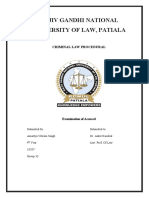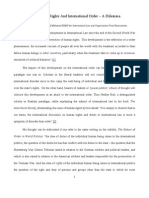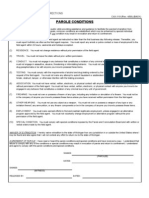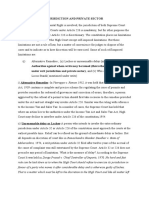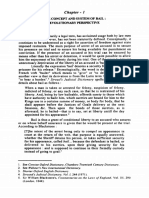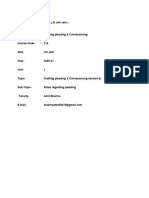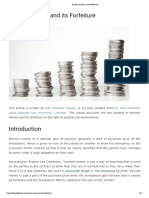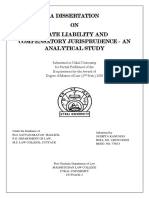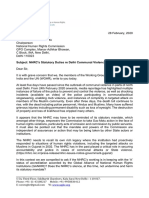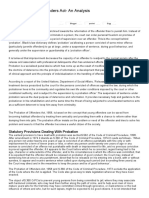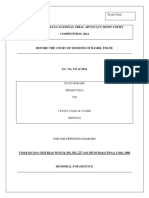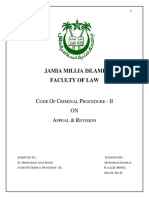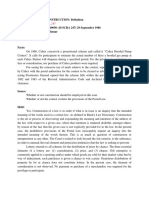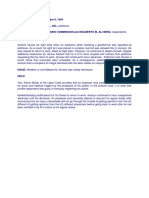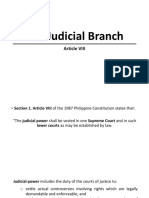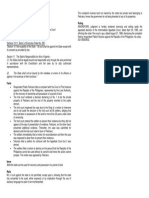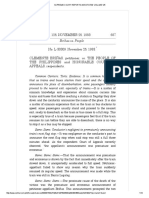UNVERSITY INSTITUTE OF LEGAL STUDIES ,
PANJAB UNIVERSITY, CHANDIGARH
FORMS OF APPEAL
Section 372- 380
C.R.P.C Project
SUBMITTED TO: Nita Ma’am
SUBMITTED BY: Rekha
CLASS: B.COM LLB(Hons.)
SEMESTER: 6
�Contents
ACKNOWLEDGMENT...................................................................................................................................3
Section 372- NO APPEALS TO LIE UNLESS OTHERWISE PROVIDED..........................................................4
SECTION 373 – APPLIES TO APPEALS FROM............................................................................................5
SECTION 374- APPEALS FROM CONVICTIONS..........................................................................................5
Section 375- No appeal in certain cases when accused pleads guilty......................................................7
Section 376- No appeal in petty cases.....................................................................................................8
Section 377- Appeal by the State Government against sentence............................................................9
Section 378- Appeal in case of acquittal................................................................................................10
SECTION 379 – APPEAL AGAINST CONVICTION BY HIGH COURT IN CERTAIN CASES.............................13
SECTION 380- SPECIAL RIGHT OF APPEAL IN CERTAIN CASES................................................................14
BIBLIOGRAPHY...................................................................................................................................15
2
�ACKNOWLEDGMENT
The success and final outcome of this project required a lot of guidance and assistance from
many people and I am extremely privileged to have got this all along the completion of my
project. All that I have done is only due to such supervision and assistance and I would not forget
to thank them. I respect and thank Nita Ma’am, for providing me an opportunity to do the project
work and giving us all support and guidance which made me complete the project duly. I am
extremely thankful to her for providing such a nice support and guidance.
3
�INTRODUCTION
The term “appeal” has not been defined in the code. It has been said that every
human being is fallible and a judge is not an exception. It is thus possible that
even a judge may err or commit mistake and his decision may be wrong or faulty.
Article 25 of the Constitution Of India guarantees life and liberty to every citizen,
small or big, rich or poor, as one of the Fundamental Rights. It is therefore,
necessary that a person aggrieved by an order of the court of the first instance
may be able to challenge it by preferring an appeal. An appeal is a method of
correction of manly error or solution of human frailty. An appeal is a complaint to
a superior court of an injustice done or error committed by an inferior one, whose
judgement or decision the court above is called upon to correct or reverse. 1
An appeal is a creature of the statute and there can be no inherent right of appeal
from any judgement or determination unless an appeal is expressely provided by
the law itself.2
Chapter XXXIX (Section 372 – 394 of Cr.PC) deals with Appeals.
Section 372- NO APPEALS TO LIE UNLESS OTHERWISE PROVIDED
It provides, no appeal lies except otherwise provided by the Code or by any other
law for the time being in force. Under Articles 132, 134 and 136 of the
Constitution of India, it may be possible to present an appeal to the Supreme
Court against the order of acquittal passed by the High Court.
Act 5 of 2009 inserted a proviso to Section 372 with effect from 31 December
2009. It gives right to the victim to file an appeal in the High Court against any
order of a criminal court acquitting an accused or convicting him for a lesser
offence or the imposition of inadequate compensation.3 It confers a right only on
a victim and also does not envisage an appeal against an inadequate sentence.
1
Black law’s dictionary (4th Edition) 124.
2
Durga Shankar Mehta v. Raghuraj Singh, AIR 1954 SC 520
3
See, Neeraj Tiwari’s “Legislative Framework and Judicial Response to the Victim’s Right of appeal”. (2013) 9 SCC J-
13.
4
�In the case of Satya Pal Singh vs State of Madhya Pradesh4, the Hon’ble Supreme
Court held that the father of the deceased has a locus standi to present an appeal
to the High Court under the proviso of Section 372, as he falls within the
definition of “victim”, to question the correctness of judgment and order of an
acquittal of accused.
This proviso has generated a lot of debate among the High Courts. Different High
Courts come up with disparate interpretations. It is argued that this right of
appeal is subject to the leave of High Court as in other cases in Section 378. This
view is being countered that the right of the victim is absolute as otherwise the
legislature could have made provision by amending Section 378 suitably.
SECTION 373 – APPLIES TO APPEALS FROM
1. Orders requiring security for keeping peace or good behavior and
2. Against order refusing to accept or rejecting to accept or rejecting a surety
under s. 121.
The appeal lies to Court of Session, except, of course, in cases where under sub-s.
(2) Or (4) of S. 122, the proceedings are already laid before the Session Judge.
SECTION 374- APPEALS FROM CONVICTIONS
Any person convicted on a trial held by a High Court in its extraordinary
original criminal jurisdiction may appeal to the Supreme Court.
Any person convicted on a trial held by a Sessions Judge or an Additional
Sessions Judge or on a trial held by any other Court in which a sentence of
imprisonment for more than seven years [has been passed against him or
against any other person convicted at the same trial]; may appeal to the
High Court
Save as otherwise provided in sub-section (2), any person,
4
Criminal Appeal No. 547 of 2013.
5
� convicted on a trial held by a Metropolitan Magistrate or Assistant
Sessions Judge or Magistrate of the first class, or of the second class,
sentenced under section 325, or
in respect of whom an order has been made or a sentence has been
passed under section 360 by any Magistrate, may appeal to the Court
of Session.
When an appeal has been filed against a sentence passed under section
376, section 376A, section 376AB, section 376B, section 376C, section
376D, section 376DA, section 376DB or section 376E of the Indian Penal
Code, the appeal shall be disposed of within a period of six months from
the date of filing of such appeal.5
While disposing of appeals from the sentences of the Sessions Court under this
Section, the High Court should specify the reasons for rejection of appeal and
should not reject it summarily. This will enable the Supreme Court to know the
view of the High Court, in case the appellant moves the Supreme Court in appeal.
For computing the sentence of imprisonment for seven years for the purpose of
ascertaining the appellate forum under Section 374 (2), the sentence in default of
payment of a fine is not to be added to the substantive sentence of
imprisonment.
An appeal from an order of acquittal must be filed within the period of limitation
prescribed by Article 114 of the Schedule of the Limitation Act, 1963. For the
extension of the period of Limitation, and for exclusion of time in computing the
period of Limitation, Section 5 and 12 of the Limitation Act, 1963 would be useful.
5
Ins. By Act 22 of 2018, sec 20
6
�CERTAIN CASE LAWS:-
In Ajit Singh Thakur Singh v. State of Gujarat6, It wa held that when two views are
possible and acquittal judgment of trial Court in murder case found reasonable,
High Court not justified in taking different view with that of trial Court.
In State of Maharashtra v. Vithal Rao Pritirao Chauhan7, It was held that leave to
appeal refused by the High Court without giving any reason liable to be set aside.
In Ajit Singh Thakur Singh v. State of Gujarat8, It was held that sufficient cause
must be established for not filing appeal within limitation period and that cause
must arise before expiry of limitation period.
In Arun Kumar v. State of Uttar Pradesh9,it was held that when the view taken by
Sessions Judge was found by High Court to be manifestly wrong and that it had
led to miscarriage of justice, High Court was entitled to set aside the acquittal.
In R.V. Murthy (Dr.) v. State of Karnataka10, In grant of leave to appeal against
acquittal issue of show-cause notice to accused before hearing appeal on merits is
without jurisdiction and misuse of power of High Court.
NO RIGHT OF APPEAL
Section 375- No appeal in certain cases when accused pleads guilty.
Notwithstanding anything contained in section 374, where an accused person has
pleaded guilty and has been convicted on such plea, there shall be no appeal.-
(a) if the conviction is by a High Court; or
(b) if the conviction is by a Court of Session, Metropolitan Magistrate or
Magistrate of the first or second class, except as to the extent or legality of the
sentence.
The rationale behind the Section 375 is that the person who deliberately pleads
guilty cannot be aggrieved by being convicted. When a person is convicted by any
6
AIR 1981
7
AIR 1982
8
AIR 1981
9
AIR 1989
10
AIR 1982
7
�court on the basis of his of own plea of guilty, he cannot and should not have any
grouse against the conviction and hence is not entitled to appeal from such a
conviction. However, if the plea of guilty is not a real one and is obtained by
trickery, it is not the plea of guilty for the purposes of the above rule. 11
It is only when there is a geniune plea of guilty made freely and voluntarily that
the bar under Section 375 would apply. In Thippaswamy v. State of Karnataka, the
Supreme Court observed that it would be violation of Article 21 of the
Constitution to induce or lead an accused to plead guilty under a promise or
assurance that he would be let off lightly and then in appeal or revision, to
enhance the sentence. A person, by pleading guilty, does not commit himself to
accept the punishment that would be passed against him irrespective of its nature
and legality. Therefore, he is not denied that right to challenge the extent or
legality of the sentence, because it can hardly be contemplated that the
judgement of a High Court would suffer from a serious infirmity in respect of the
extent or legality of the sentence.
Section 376- No appeal in petty cases.
Notwithstanding anything contained in section 374, there shall be no appeal by a
convicted person in any of the following cases, namely-
(a) where a High Court passes only a sentence of imprisonment for a term not
exceeding six months or of fine not exceeding one thousand rupees, or of both
such imprisonment and fine;
(b) where a Court of Session or a Metropolitan Magistrate passes only a sentence
of imprisonment for a term not exceeding three months or of fine not exceeding
two hundred rupees, or of both such imprisonment and fine;
(c) where a Magistrate of the first class passes only a sentence of fine not
exceeding one hundred rupees; or
(d) where, in a case tried summarily, a Magistrate empowered to act
under section 260 passes only a sentence of fine not exceeding two hundred
rupees:
11
Prafulla Kumar Roy v. Emperor, (1944) 45 Cri LJ AIR 1944 Cal 120
8
�Provided that an appeal may be brought against any such sentence if any other
punishment is combined with it, but such sentence shall not be appealable merely
on the ground-
(i) that the person convicted is ordered to furnish security to keep the peace; or
(ii) that a direction for imprisonment in default of payment of fine is included in
the sentence; or
(iii) that more than one sentence of fine is passed in the case, if the total amount
of fine imposed does not exceed the amount hereinbefore specified in respect of
the case.
Section 377- Appeal by the State Government against sentence.
(1) Save as otherwise provided in sub-section (2), the State Government may in
any case of conviction on a trial held by any Court other than a High Court, direct
the Public prosecutor to present an appeal to the High Court against the sentence
on the ground of its inadequacy-
(a) to the Court of session, if the sentence is passed by the Magistrate; and
(b) to the High Court, if the sentence is passed by any other Court”;
(c) in Sub-Section (3), for the words “the High Court”, the words “the Court of
Session or, as the case may be, the High Court” shall be substituted.
(2) If such conviction is in a case in which the offence has been investigated by the
Delhi Special Police Establishment, constituted under the Delhi Special Police
Establishment Act, 1946 (25 of 1946), or by any other agency empowered to
make investigation into an offence under any Central Act other than this Code,
the Central Government may also direct the Public Prosecutor to present an
appeal to the High Court against the sentence on the ground of its inadequacy.
(3) When an appeal has been filed against the sentence on the ground of its
inadequacy, the High Court shall not enhance the sentence except after giving to
the accused a reasonable opportunity of showing cause against such
enhancement and while showing cause, the accused may plead for his acquittal or
for the reduction of the sentence.
(4) When an appeal has been filed against a sentence passed under section 376,
section 376A, section 376AB, section 376B, section 376C, section 376D, section
9
�376DA, section 376DB or section 376E of the Indian Penal Code, the appeal shall
be disposed of within a period of six months from the date of filing of such
appeal.
In the case of State of Karnataka v. Benoy Thomas12, it was held that it would be
clearly violative of Article 21 of the Constitution of India to induce or lead an
accused to plead guilty under a promise or assurance that he would be let off
lightly and then in appeal or revision to enhance the sentence.
Section 377 confers right on the Government to file an appeal against the
inadequacy of sentence awarded by any court other than a High court. If the
sentence appears to be manifestly inadequate resulting in failure of justice, the
appellate court can interfere with it and can enhance the sentence. But at the
same time, the high court can also exercise its revisional jurisdiction, suo motto
call for the record and enhance the sentence in appropriate cases after giving an
opportunity to the accused.13
Section 378- Appeal in case of acquittal.
(1) Save as otherwise provided in sub-section (2) and subject to the provisions of
sub-sections (3) and (5),
(a) the District Magistrate may, in any case, direct the Public Prosecutor to
present an appeal to the Court of Session from an order of acquittal passed by a
Magistrate in respect of a cognizable and non-bailable offence;
(b) the State Government may, in any case, direct the Public Prosecutor to
present an appeal to the High Court from an original or appellate order of an
acquittal passed by any Court other than a High Court [not being an order under
clause (a) or an order of acquittal passed by the Court of Session in revision.”]
(2) If such an order of acquittal is passed in any case in which the offence has
been investigated by the Delhi Special Police Establishment constituted under the
Delhi Special Police Establishment Act, 1946 (25 of 1946) or by any other agency
empowered to make investigation into an offence under any Central Act other
than this Code, the Central Government may, subject to the provisions of Sub-
12
(1997) 2 Crimes 141 (Kant).
13
Bachan Singh v. State of Punjab, AIR 1980 SC 267
10
�Section (3), also direct the Public Prosecutor to present an appeal-
(a) to the Court of Session, from an order of acquittal passed by a Magistrate in
respect of a cognizable and non-bailable offence;
(b) to the High Court from an original or appellate order of an acquittal passed by
any Court other than a High Court [not being an order under clause (a) or an order
of acquittal passed by the Court of Session in revision.]
(3) No appeal under sub-section (1) or sub-section (2) shall be entertained except
with the leave of the High Court.
(4) If such an order of acquittal is passed in any case instituted upon complaint
and the High Court, on an application made to it by the complainant in this behalf,
grants special leave to appeal from the order of acquittal, the complainant may
present such an appeal to the High Court.
(5) No application under sub-section (4) for the grant of special leave to appeal
from an order of acquittal shall be entertained by the High Court after the expiry
of six months, where the complainant is a public servant, and sixty days in every
other case, computed from the date of that order of acquittal.
(6) If, in any case, the application under sub-section (4) for the grant of special
leave to appeal from an order of acquittal is refused, no appeal from that order of
acquittal shall lie under sub-section (1) or under sub-section (2).
Appeal against an order of acquittal is an extraordinary remedy. In exercising this
power the High Court should give proper weight and consideration to “Very
substantial and compelling reasons.
In Chandrappa & Others v. State of Karnataka14, Supreme Court held:
1. An appellate court has full power to review, re-appreciate and reconsiders
the evidence upon which the order of acquittal is founded.
2. The Code of Criminal Procedure, 1973 puts no limitation, restriction or
condition on the exercise of such power and an appellate court on the
14
AIR (2007) 4 SCC 415
11
� evidence before it may reach its own conclusion, both on questions of fact
and of law.
3. Various expressions, such as, “substantial and compelling reasons”, “good
and sufficient grounds”, “very strong circumstances”, “distorted
conclusions”, “glaring mistakes”, etc. are not intended to curtail extensive
powers of an appellate court in an appeal against acquittal. Such
phraseology are more in the nature of “flourishes of language” to
emphasize reluctance of an appellate court to interfere with acquittal than
to curtail the power of the court to review the evidence and to come to its
own conclusion.
4. An appellate court, however, must bear in mind that in case of acquittal,
there is double presumption in favour of the accused. Firstly, the
presumption of innocence is available to him under the fundamental
principle of criminal jurisprudence that every person shall be presumed to
be innocent unless he is proved guilty by a competent court of law.
Secondly, the accused having secured his acquittal, the presumption of his
innocence is further reinforced, reaffirmed and strengthened by the trial
court.
5. If two reasonable conclusions are possible on the basis of the evidence on
record, the appellate court should not disturb the finding of acquittal
recorded by the trial court.”
In case of State of Maharashtra v. Joseph Mingel Koli15, In an appeal against
acquittal the appellate Court has the undoubted power to review the entire
evidence and to come to its own conclusion, but, in doing so, it should not only
consider every matter on record having a bearing on the question of fact and the
reasons given by the Court below in support of its order of acquittal but also
should express the reasons in its judgment which let it to hold that the acquittal
was not justified.
15
(1997) 2 Crimes 228 (Bom)
12
�In case of State of Maharashtra v. Suresh Nivrutti Bhurare16, If two conclusions can
be based upon the evidence on record the High Court should not disturb the
finding of acquittal recorded by the trial Court.
SECTION 379 – APPEAL AGAINST CONVICTION BY HIGH COURT IN
CERTAIN CASES
Where the High Court has, on appeal, reversed an order of acquittal of an accused
person and convicted him and sentenced him to death or to imprisonment for life
or to imprisonment for a term of ten years or more, he may appeal to the
Supreme Court.
An appeal to would lie to the Supreme Court as a matter of right when High
Court, on appeal,
1. Reversed an order of Acquittal of an accused person and
2. Convicted and sentenced him to death or to imprisonment for life or to
imprisonment for a term of ten years or more.17
In other cases appeal can be filed, if the High Court certifies that the case is a fit
one for appeal to the Supreme Court. Only grave injustice manifest on record can
induce the Supreme Court to interfere with the concurrent finding of guilt of
Courts below. The Court would be slow in reversing the finding entered by the
High Court unless there is a perverse and erroneous appreciation of evidence. If
the High Court, for acquitting the accused has given certain tenable reasons, the
Supreme Court would not be justified in interfering with such acquittal. 18 The
word “acquittal” doesn’t mean that the trial must have ended in a complete
acquittal but would also include the case where an accused has been acquitted of
the charge of murder and has been convicted of a lesser offense. 19
16
(1997) 2 Crimes 257 (Bom)
17
Chandra Mohan Tiwari v. State of Madhya Pradesh, AIR 1992 SC 891.
18
Vijaybhai Bhanabhai Patel v. Navnitbhai Nathubhai Patel, (2004) 10 SCC 583.
19
Tarachand Damu v. State of Maharashtra, 1962 AIR 130.
13
�SECTION 380- SPECIAL RIGHT OF APPEAL IN CERTAIN CASES
Notwithstanding anything contained in this Chapter, when more persons than
one are convicted in one trial, and an appealable judgment or order has been
passed in respect of any of such person, all or any of the persons convicted at
such trial shall have a right of appeal.
14
�BIBLIOGRAPHY
Kelkar, R.V. ; Criminal Procedure (2019); Eastern Book Company
Bare Act: The Criminal Procedure Code (2019); Lexis Nexis
15
